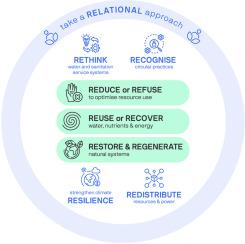循环型供水和卫生系统的 8R:利用循环经济思维提供安全、弹性和包容性服务
IF 4.7
2区 环境科学与生态学
Q2 ENVIRONMENTAL SCIENCES
引用次数: 0
摘要
为了实现规范的健康、环境和社会目标,供水和卫生服务必须具有安全管理、包容性和气候适应性。要满足这些要求,就需要对供水和卫生服务系统进行创新思考,这也是一个机遇。循环经济概念正被应用于众多产品和服务部门,目的是促进资源的再生流动。鉴于水资源的依赖性、相关的气候风险以及在提供水和卫生服务过程中产生的可重复使用的废品,循环经济概念可以有效地利用来推动可持续发展成果。本文以概念框架的形式提供了一种启发式方法,用于在全球南部不同环境中将循环经济概念应用于水和卫生服务的设计与提供。该框架旨在推动与供水和卫生设施相关的多种成果:安全管理服务、社会包容和气候适应力。该启发式框架由一个国际研究团队共同开发,采用了理论多重性方法和协作感知法,其形式是一套针对水和卫生设施的八项经调整的循环经济 "R 战略"。这些 "R 战略 "的选择和阐述反映了以理论为基础的循环经济、气候适应性和包容性原则。它们旨在促进思考和行动,以追求安全管理、气候适应力强、具有包容性的水和卫生服务,并与循环经济论述所期望的更广泛的可持续发展方向保持一致。启发式提供了一个概念严谨、实用的工具,可以支持合作、审议过程,以实现水和卫生服务系统循环性的潜在效益。本文章由计算机程序翻译,如有差异,请以英文原文为准。

8Rs for circular water and sanitation systems: Leveraging circular economy thinking for safe, resilient and inclusive services
To achieve their normative health, environmental and social objectives, water and sanitation services must be safely managed, inclusive and climate resilient. Meeting these imperatives presents a need and opportunity for innovative thinking about water and sanitation service systems. Circular economy concepts are being applied across a multitude of product and service sectors with the aim to facilitate regenerative flows of resources. Given the dependence on water resources, associated climate risks, and the generation of reusable waste products in water and sanitation service delivery, circular economy concepts can be usefully leveraged to drive sustainability outcomes. This article contributes a heuristic in the form of a conceptual framework for applying circular economy concepts in the design and delivery of water and sanitation services in diverse Global South contexts. The framework seeks to drive multiple outcomes relevant to water and sanitation initiatives: safely managed services, social inclusion, and climate resilience. Co-developed by an international research team applying a theoretical multiplicity approach and collaborative sensemaking, the heuristic takes the form of a suite of eight adapted circular economy ‘R strategies’ for water and sanitation. The R strategies were selected and articulated to reflect theory-based principles of circular economy, climate resilience and inclusion. They are intended to prompt thinking and action in pursuit of safely managed, climate resilient, inclusive water and sanitation services that align with the broader sustainability directions that circular economy narratives aspire to. The heuristic offers a conceptually rigorous, practical tool that can support collaborative, deliberative processes to realise the potential benefits of circularity in water and sanitation service systems.
求助全文
通过发布文献求助,成功后即可免费获取论文全文。
去求助
来源期刊

Environmental Development
Social Sciences-Geography, Planning and Development
CiteScore
8.40
自引率
1.90%
发文量
62
审稿时长
74 days
期刊介绍:
Environmental Development provides a future oriented, pro-active, authoritative source of information and learning for researchers, postgraduate students, policymakers, and managers, and bridges the gap between fundamental research and the application in management and policy practices. It stimulates the exchange and coupling of traditional scientific knowledge on the environment, with the experiential knowledge among decision makers and other stakeholders and also connects natural sciences and social and behavioral sciences. Environmental Development includes and promotes scientific work from the non-western world, and also strengthens the collaboration between the developed and developing world. Further it links environmental research to broader issues of economic and social-cultural developments, and is intended to shorten the delays between research and publication, while ensuring thorough peer review. Environmental Development also creates a forum for transnational communication, discussion and global action.
Environmental Development is open to a broad range of disciplines and authors. The journal welcomes, in particular, contributions from a younger generation of researchers, and papers expanding the frontiers of environmental sciences, pointing at new directions and innovative answers.
All submissions to Environmental Development are reviewed using the general criteria of quality, originality, precision, importance of topic and insights, clarity of exposition, which are in keeping with the journal''s aims and scope.
 求助内容:
求助内容: 应助结果提醒方式:
应助结果提醒方式:


